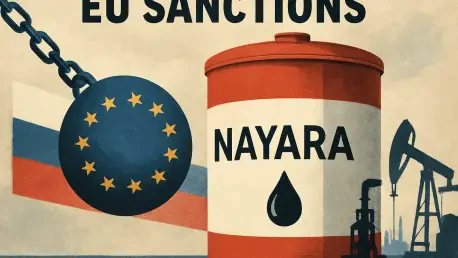In the intricate landscape of global energy markets, India’s Nayara Energy finds itself navigating turbulent waters following the European Union sanctions connected to Russia’s conflict in Ukraine. These sanctions have rippled across various facets of the company’s operations, forcing significant alterations in typical procedures. Notably, Nayara’s fuel export plans have been especially impacted, with tanker ships modifying their routes and refraining from loading fuel in the usual manner. This shift is emblematic of the broader uncertainties and logistical challenges faced by the company, highlighting the complex interplay between geopolitical factors and business operations in the energy sector.
Obstacles in International Shipments
Altered Fuel-Loading Plans
A vivid illustration of the sanctions’ impact is seen in the behavior of two tanker ships associated with Nayara Energy’s operations, particularly Chang Hang Xing Yun and Talara. These vessels were originally destined to load fuel from Nayara’s Vadinar port; however, recent decisions have diverted their plans. Chang Hang Xing Yun, for example, has opted to load approximately 35,000 metric tons of ultra-low sulfur diesel from Kuwait, with East Africa as its destination. This development underscores the shifting dynamics and uncertainties introduced by the sanctions, which compel Nayara to make rapid adjustments to its logistical arrangements. Such changes resonate with the company’s broader difficulties in maintaining seamless export activities under the current constraints.
Broader Implications on Trade and Logistics
The ripple effects of the sanctions extend beyond immediate logistical alterations, casting a shadow on Nayara’s broader trade operations. Each alteration in shipping plans necessitates a recalibration of logistical frameworks, affecting the company’s ability to meet supply commitments both domestically and internationally. The need for agility in responding to these unanticipated changes injects an additional layer of complexity into Nayara’s operational strategy. While the company’s adaptability is noteworthy, the ongoing demands of realigning logistical operations to navigate sanctions mean that Nayara could face continuous disruptions, potentially impacting its market share and competitive standing on a global scale.
Domestic Front Challenges
Impact on Local Consumption and Retail
Within India, Nayara Energy also confronts significant hurdles that further complicate its operational landscape. Despite being a substantial player in the Indian energy market, Nayara finds itself grappling with constraints on domestic retail opportunities. Indian state refiners, who dominate local retail fuel sales, have expressed reluctance to purchase Nayara’s products. This stance stems from both the sufficiency of local supply and the regulatory necessity for government approval to enter into agreements with Nayara amid the prevailing sanctions climate. This resistance from key domestic stakeholders amplifies the financial and operational strains on Nayara, making it imperative for the company to seek alternative strategies for distributing its output.
Financial and Operational Disruptions
The broader economic ramifications for Nayara are far-reaching, impacting core operational metrics such as fuel output and refining capacity. The imposition of EU sanctions translates to potential disruptions in the supply chain, with an estimated impact on approximately 200,000 barrels of ultra-low sulfur diesel and 50,000 barrels of jet fuel imports into Europe from Nayara. These figures highlight the scale of the challenge as the sanctions pose not only immediate operational setbacks but also threaten future credit lines crucial for sustaining crude supplies to Nayara’s refineries. As the company looks to navigate these complexities, analysts speculate that Nayara may need to resort to offering substantial discounts in order to maintain sales.
Strategic Considerations and Future Outlook
Geopolitical and Economic Complexities
As Nayara Energy continues to grapple with the realities imposed by the EU sanctions, the broader geopolitical and economic context remains a critical consideration. The company’s criticism of the EU’s measures as “unjust and unilateral” reflects the tension and misalignment between regional regulatory frameworks and the interests of non-EU countries like India. This situation underscores a fundamental geopolitical complexity, where local companies must operate within the exigencies of international political considerations. For Nayara, this translates into a need for strategic recalibration, potentially demanding a restructuring of business priorities to align with changing global dynamics while safeguarding its economic viability.
Potential Risks and Future Trade Dynamics
In the complex realm of global energy markets, Nayara Energy, an important player in India, is encountering serious challenges due to European Union sanctions related to Russia’s ongoing conflict in Ukraine. These sanctions have sent ripples throughout the company’s various operations, necessitating substantial changes in its routine procedures. A particularly affected area is Nayara’s fuel export strategies. The company has been compelled to alter tanker ship routes, with ships opting to avoid customary fuel loading practices. This deviation illustrates the broader uncertainties and logistical hurdles Nayara faces, underscoring the intricate relationship between geopolitical issues and business activities within the energy sector. These challenges are emblematic of the delicate balancing act energy companies must perform amid rapidly changing global political dynamics, highlighting the stark impact of international relations on the logistics and economics of energy companies operating in a globally connected market.









